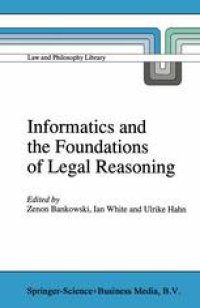
Ebook: Informatics and the Foundations of Legal Reasoning
- Tags: Philosophy of Law, Theories of Law Philosophy of Law Legal History, Artificial Intelligence (incl. Robotics), Logic
- Series: Law and Philosophy Library 21
- Year: 1995
- Publisher: Springer Netherlands
- Edition: 1
- Language: English
- pdf
Informatics and the Foundations of Legal Reasoning represents a close collaboration between a wide range of disciplines and countries. Fourteen papers, together with a long analytical introduction by the editors, were selected from the contributions of legal theorists, computer scientists, philosophers and logicians who were members of an International Working Group supported by the European Commission. The Group was mandated to work towards determining how far the law is amenable to formal modeling, and in what ways computers might assist legal thinking and practice. The book is the result of discussions held by the Group over two and half years. It will help students and researchers from different backgrounds to focus on a common set of topics of increasing general interest. It embodies the results of work in progress and suggests many issues for further discussion.
A stimulating text for undergraduate and graduate courses in law, philosophy and computer science departments, as well as for those interested in the place of computers in legal practice, especially at the international level.
Informatics and the Foundations of Legal Reasoning represents a close collaboration between a wide range of disciplines and countries. Fourteen papers, together with a long analytical introduction by the editors, were selected from the contributions of legal theorists, computer scientists, philosophers and logicians who were members of an International Working Group supported by the European Commission. The Group was mandated to work towards determining how far the law is amenable to formal modeling, and in what ways computers might assist legal thinking and practice. The book is the result of discussions held by the Group over two and half years. It will help students and researchers from different backgrounds to focus on a common set of topics of increasing general interest. It embodies the results of work in progress and suggests many issues for further discussion.
A stimulating text for undergraduate and graduate courses in law, philosophy and computer science departments, as well as for those interested in the place of computers in legal practice, especially at the international level.
Informatics and the Foundations of Legal Reasoning represents a close collaboration between a wide range of disciplines and countries. Fourteen papers, together with a long analytical introduction by the editors, were selected from the contributions of legal theorists, computer scientists, philosophers and logicians who were members of an International Working Group supported by the European Commission. The Group was mandated to work towards determining how far the law is amenable to formal modeling, and in what ways computers might assist legal thinking and practice. The book is the result of discussions held by the Group over two and half years. It will help students and researchers from different backgrounds to focus on a common set of topics of increasing general interest. It embodies the results of work in progress and suggests many issues for further discussion.
A stimulating text for undergraduate and graduate courses in law, philosophy and computer science departments, as well as for those interested in the place of computers in legal practice, especially at the international level.
Content:
Front Matter....Pages i-xiii
Introduction....Pages 1-71
Policy Arguments and Legal Reasoning....Pages 73-97
Defeasibility in Law and Logic....Pages 99-117
Defeasibility in Legal Reasoning....Pages 119-157
On Some Problems of the Theory of Legal Argumentation....Pages 159-176
Analogical Reasoning and Legal Institutions....Pages 177-190
The Redundancy of Reasoning....Pages 191-204
Ontology and Dimension in Legal Reasoning....Pages 205-224
Common Law Concepts — The Problem of Indefinability....Pages 225-244
Formalization, Invention, Justification....Pages 245-269
On the R?le of Deontic Logic in the Characterization of Normative Systems....Pages 271-289
AI, Legal Theory and EC Law: A Mapping of the Main Problems....Pages 291-309
Building an Intestate Succession Adviser: Compartmentalisation and Creativity in Decision Support Systems....Pages 311-323
Legislation as Logic Programs....Pages 325-356
Using Information Technology as a Determiner of Legal Facts....Pages 357-369
Back Matter....Pages 371-375
Informatics and the Foundations of Legal Reasoning represents a close collaboration between a wide range of disciplines and countries. Fourteen papers, together with a long analytical introduction by the editors, were selected from the contributions of legal theorists, computer scientists, philosophers and logicians who were members of an International Working Group supported by the European Commission. The Group was mandated to work towards determining how far the law is amenable to formal modeling, and in what ways computers might assist legal thinking and practice. The book is the result of discussions held by the Group over two and half years. It will help students and researchers from different backgrounds to focus on a common set of topics of increasing general interest. It embodies the results of work in progress and suggests many issues for further discussion.
A stimulating text for undergraduate and graduate courses in law, philosophy and computer science departments, as well as for those interested in the place of computers in legal practice, especially at the international level.
Content:
Front Matter....Pages i-xiii
Introduction....Pages 1-71
Policy Arguments and Legal Reasoning....Pages 73-97
Defeasibility in Law and Logic....Pages 99-117
Defeasibility in Legal Reasoning....Pages 119-157
On Some Problems of the Theory of Legal Argumentation....Pages 159-176
Analogical Reasoning and Legal Institutions....Pages 177-190
The Redundancy of Reasoning....Pages 191-204
Ontology and Dimension in Legal Reasoning....Pages 205-224
Common Law Concepts — The Problem of Indefinability....Pages 225-244
Formalization, Invention, Justification....Pages 245-269
On the R?le of Deontic Logic in the Characterization of Normative Systems....Pages 271-289
AI, Legal Theory and EC Law: A Mapping of the Main Problems....Pages 291-309
Building an Intestate Succession Adviser: Compartmentalisation and Creativity in Decision Support Systems....Pages 311-323
Legislation as Logic Programs....Pages 325-356
Using Information Technology as a Determiner of Legal Facts....Pages 357-369
Back Matter....Pages 371-375
....